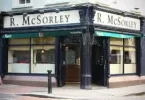LVA and VFI warn against effect of Living Wage costs to hospitality sector

The LVA and VFI say that hospitality businesses cannot withstand such a swift surge in expenses (Photo by cottonbro studio via Pexels)
The Licensed Vintners Association (LVA) has said the government’s assessment on changes to employment conditions shows that the introduction of the ‘Living Wage’ must be slowed down and the Vintners’ Federation of Ireland (VFI) believes that government must address runaway costs that are threatening small businesses in the hospitality sector.
The LVA believes that the government should instead commit to a five year timeframe from this year for the introduction of the Living Wage, i.e. 2024-29, so as to allow labour intensive, low margin sectors like hospitality to have time to adapt to the increased costs.
In the government’s study entitled, ‘An Assessment of the Cumulative Impact of Proposed Measures to Improve Working Conditions in Ireland’, it is estimated that the impact of the government imposed employment costs could come to as much as 36.7% for a small hospitality business by 2026. The LVA says no pubs or hospitality businesses can sustain such a rapid increase in costs.
This government estimate does not include the increased rates of Employers’ PRSI which will also take effect, meaning the cost is likely to be even higher. Among the government measures included in the estimate are the Living Wage, the pension auto-enrolment and the increased sick leave entitlements.
Donall O’Keeffe, chief executive officer, LVA, said: “We believe that these government imposed costs of employment represent too much, too fast for the hospitality sector. Small businesses can’t be expected to accommodate a rise in employment costs of this level in the next three years. The government’s own study says they could reach as high as 36.7% by 2026, a figure which doesn’t even include Employers’ PRSI. That simply isn’t sustainable for hospitality or small businesses.”
O’Keefe suggests a more gradual transition to a ‘Living Wage,’ proposing a phased implementation over the next five years starting from 2024, as opposed to the current two-year plan to allow small businesses sufficient time to adapt.
“We also don’t think it is realistic how the government has gone about calculating these raises. Linking these increases to what is happening at the multinational or public sector simply isn’t comparable to the situation facing small businesses with high labour costs. A re-introduction of the 9% VAT on food is now essential and well as evaluation of wage/cost supports for low margin, labour intensive businesses such as hospitality.
Also responding to the publication of the government report The VFI says that small businesses are bearing the brunt of a government policy to introduce a living wage, pension auto enrolment and increased sick leave, all of which come at a massive cost to publicans. According to Pat Crotty, VFI chief executive: “Our members can’t absorb such a dramatic increase in their cost base to the point that many will be forced to close.
“The government report admits that the hospitality sector will be the ‘most affected’ by these changes so it’s the responsibility of government to do something about this mess.
“It’s astonishing to us that in this report the government states that ‘where additional payroll costs do arise, however, these are not a cost to the economy’. This completely ignores the impact on our members who have to foot the bill.
“We’re calling on government to introduce a more realistic time-frame for the introduction of the living wage, as 2026 is too soon for publicans who are fighting to survive. The trade also needs meaningful supports and not the ‘suite of measures’ Minister Coveney announced. An enterprise hub and a top-up for the energy efficiency grant will not help pubs struggling to cover the weekly staff wages. In effect, the minister is asking publicans to spend money to receive funding, which is simply not tenable,” said Crotty.








